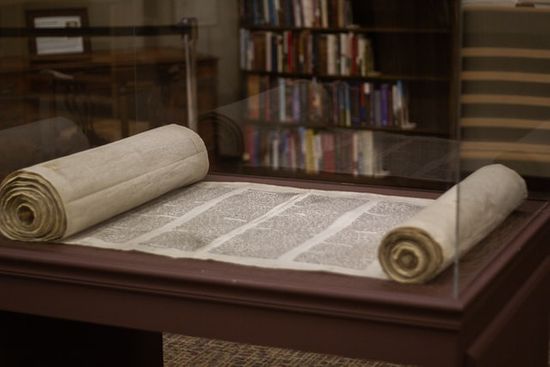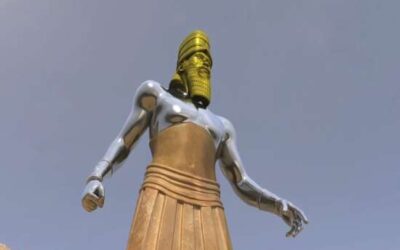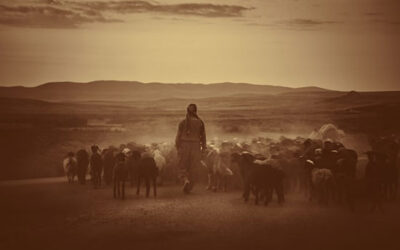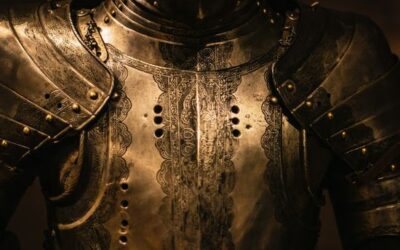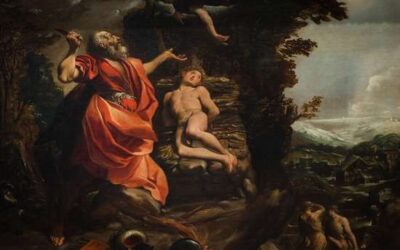War, bloodshed, murder, adultery—all of these crimes overshadowed the life of a biblical Old Testament man named David.
Yet he was called a man after God’s own heart, not to mention one of Israel’s greatest heroes and kings.
So who was this David guy, and what does “a man after God’s own heart” mean? What was it about him that brought about that description?
We’re going to look at David’s life as an overview: trusting in God from early on, his successes as king, the mistakes he made when he deviated from God’s guidance, and how he moved past a dark time in his life.
We’ll examine:
Let’s get started with David’s foundational experiences as a young man.
The early years
Kings often come from rich, powerful families. But God had a different idea in mind when He chose David for Israel’s great king.
Being a shepherd: developing valuable skills
 David was the youngest son of Jesse, the eighth son. In ancient Israel, the oldest son was the one who received the birthright and the most attention (Genesis 25:22-34), so David didn’t hold much importance as the eighth son.
David was the youngest son of Jesse, the eighth son. In ancient Israel, the oldest son was the one who received the birthright and the most attention (Genesis 25:22-34), so David didn’t hold much importance as the eighth son.
He had the task of caring for his father’s sheep. It was out here on the barren plains and rocky hills that young David played the harp, or lyre, as he watched over the sheep.
Not only did David learn to manage many moving animals effectively, but he learned to appreciate and develop his musical skill. He also spent a lot of time with God and learned to trust Him.
And God’s influence in his life was evident early on.
Lions and bears even tried to steal sheep from the flock, but David chased them down. Then he’d rescue the sheep right from the jaws of its captor. And even when one of these beasts rose up against him, he’d grab it by its fur and kill it (1 Samuel 17:34-36).
And he made sure to give the credit to God for this miraculous feat (verse 37).
Anointed to be king (1 Samuel 16:1-13)
During this time as a shepherd, David was anointed to be king by the prophet Samuel. God told Samuel to go to the house of Jesse, where he would find the next king of Israel.
Israel already had a king—Saul. But Saul had stopped obeying God, despite Samuel’s numerous warnings and chastenings. It was time for a new king, one whom God Himself would describe as “a man after My own heart, who will carry out all My will” (Acts 13:22, CSB).
Samuel came to Jesse’s home in Bethlehem and had all his sons stand before him. But the Lord told Samuel that none of them were His choice. So Samuel asked if Jesse had more sons.
Jesse had forgotten his youngest son, David! This was how unimportant his father thought he was. But David was summoned from the field and instantly, God told Samuel that he was the one.
Samuel ceremoniously poured oil over David’s head, anointing him as king. 1 Samuel 16:13 says from that moment, the Spirit of the Lord was with David.
David’s introduction to the palace…and to Saul (see 1 Samuel 16:14-23)
 Despite David’s youth and apparent unimportance to his father, the word about David’s skills in music had already spread—all the way to King Saul’s palace.
Despite David’s youth and apparent unimportance to his father, the word about David’s skills in music had already spread—all the way to King Saul’s palace.
Saul was bothered by evil spirits. On the suggestion of his servants, he brought David into the court to play calming music for him.
And it worked. God made it so David’s music would relieve the spiritual torment he was experiencing.
While David played for Saul, he had the opportunity to observe the royal life—excellent training for his future role. He even made friends with Saul’s son, Jonathan. And he placed absolute trust in God.
Encounter with Goliath (see 1 Samuel 17:40-54)
David’s first test of trust came with the mighty Philistine giant Goliath. The Philistines were a neighboring country and a perennial problem for the Israelites. This giant was nearly 10 feet tall.
Goliath was taunting Israel and its God, something David could not tolerate.
But he was so small compared to Goliath. Could he really expect to slaughter this man? Everybody else was convinced Goliath would step on him just like you’d step on a beetle.
But David declared, “‘The Lord, who delivered me from the paw of the lion and from the paw of the bear, He will deliver me from the hand of this Philistine” (1 Samuel 17:37, NKJV).
God had gotten him out of tough situations before, and He could do it again.
Saul must have been astonished, but he let David go.
Goliath couldn’t believe that David was to fight him. He said tauntingly, “Am I a dog, that you come to me with sticks?” (1 Samuel 17:43, NKJV).
But David was cool and collected. He replied, “This day the Lord will deliver you into my hand, and I will strike you and take your head from you. …that all the earth may know that there is a God in Israel” (1 Samuel 17:46, NKJV).
Goliath rushed toward David, but David was ready. Using a slingshot and a stone, he struck Goliath in the head, and the giant thundered to the ground. Quickly David ran up to him, grabbed Goliath’s sword, and cut off his head—like he said he would.
The Philistines fled.
David didn’t keep all the glory for himself. But he did keep Goliath’s sword as a souvenir.
He praised God for his success and defeat of the Philistines.
Fugitive from Saul (see 1 Samuel 18-31)
Saul was so pleased with David that he let him marry his daughter, Michal. But then his favor toward David started to fade—as his jealousy grew.
David was promoted in the military and was responsible for several victories in battle. We’re even told that when Israel’s army would come back from fighting, “women came out from all the cities of Israel to meet King Saul, singing and dancing with tambourines, with shouts of joy, … ‘Saul has killed his thousands, but David his tens of thousands’” (1 Samuel 18:6-7, CSB).
Direct comparisons can really sting. And Saul’s jealousy grew to dangerous levels.
Soon, it was clear that David was not safe to be around Saul. One time, when David came in to play music for him, Saul tried to pin him to the wall with a spear!
For years, he and his general, Abner, chased down David with an entire army, trying to kill him.
David became an outlaw.
Imagine if you were camping out in the wilderness with no stable job, few friends, subsisting on foraged food, and hiding from the leader of the country—who’s also your father-in-law—and who is out to kill you! That would be extremely disheartening.
Yet, despite his constant struggle to stay one step ahead of Saul, David trusted in God. He knew God had a plan, even if it didn’t look very hopeful at present. After all, He had decreed David would be the next king. So surely He would work it out with Saul.
These trials and absolute trust led him to pen the famous psalm, “The Lord is my shepherd; I shall not want. … Yea, though I walk through the valley of the shadow of death, I will fear no evil; for You are with me; Your rod and Your staff, they comfort me” (Psalm 23:1,4, NKJV).
Some other Psalms he wrote during this time are Psalms 34, 52, 54, and 57.
David not only trusted in God when things were a mess, but he often consulted God before military expeditions. During this time as a fugitive, he received word that the Philistines were attacking the town of Keilah.
Instead of making his own decision, David turned to God and asked Him if he should fight the Philistines. God gave him the go-ahead. Even when the men voiced their fears of going, David returned to God for a reaffirmation of His decision, which He gave.
After many years, Saul and his sons were killed by the Philistines at the battle of Gilboa. God took care of things in His own time, and thus positioned David to become king.
King of Israel (2 Samuel 1-1 Kings 2:10)
David had a hard road ahead of him as king. At first, he reigned only over the tribe of Judah because Saul’s other son Ishbosheth had taken the throne of Israel.
Israel and Judah used to be (and were supposed to be) united, but they were continually at war.
But Judah had the upper hand. Abner, Saul’s general, abandoned Ishbosheth and went to David. Then two men slaughtered Ishbosheth while he was resting. After seven years of war, Israel came under David’s rulership.
Saul had neglected Israel in his relentless pursuit of David and had turned the people away from God with his delusions.
So David’s first big task as king was to establish the Israelite kingdom.
Establishing the kingdom (2 Samuel 5-10)
 David was a man of military success. Some of his greatest feats as king came from successful (and prayer-led) military tactics.
David was a man of military success. Some of his greatest feats as king came from successful (and prayer-led) military tactics.
Early in his kingship, he and his general Joab strategically conquered the stronghold of Jebus and rebuilt the city, calling it Jerusalem. This became Israel’s capital. And later, it would be known as the “city of David.”
David also subdued the Philistines and fought other enemy nations like the Canaanites, Syrians, Amalekites, and Ammonites.
Another of David’s major accomplishments in establishing his kingdom was the retrieval and placement of the Ark of the Covenant at Jerusalem. It had always held the Ten Commandments and a few other articles. For several months, it had been in captivity in Philistia and then spent 20 years in Kirjath Jearim, in Israel. Its return to Jerusalem signified a return of religion, Judaism, to Israel.
David’s temptation (see 2 Samuel 11-12:24)
But just because David was a good king didn’t mean he was a perfect man. Throughout his life he indeed sought out God on a regular basis, but he was not without problems.
And with all of his successes and prosperity of a growing Israel, he started to grow complacent and less resilient against temptation.
God created men to have one wife and women to have one husband. He condemned polygamy multiple times in the Bible (Deuteronomy 17:17; Titus 1:6; 1 Timothy 3:12).
But David let his lust overtake him, and he began taking more and more wives, and concubines as well: Michal, Abigail, Ahinoam, Maacah, Haggith, Abital, Eglah, and Bathsheba.
True to form, having multiple spouses caused strife in later years.
And the way he ended up with his newest wife involves a story of a dark time in David’s life. A time when he clearly wasn’t paying attention to God’s guidance.
This story begins one evening when his army was out fighting…but he wasn’t. He used to go with them into battle, but it seems he didn’t feel it was necessary anymore.
So David was strolling along his rooftop and saw a woman bathing. Temptation overtook him, and he asked about her. Her name was Bathsheba, and her husband was Uriah the Hittite, one of David’s most honorable soldiers, who was out fighting with the army.
Ignoring all thoughts of reason, David bowed to his impulsive emotions and slept with Bathsheba. Not long afterward, she told him she was pregnant.
Instead of confessing his sin, David tried to cover it with deception. He had Uriah brought home on a short leave, in hopes that he would sleep with Bathsheba…and then everyone would naturally assume that he fathered his wife’s child. But Uriah would not go to his house, feeling guilty that he wasn’t fighting when everyone else was.
Then David stooped to his very lowest. Uriah must be killed, he thought, so he could rightfully marry Bathsheba. Then he wouldn’t look like an adulterer…he’d look like he was looking out for a widow.
So he sent Uriah back to battle and ordered his general to have Uriah sent to the thickest part of the fighting…where he was killed.
David let pride, lust, and deceit ruin him…so that he would even murder his own faithful soldier.
But even so, the “plan” worked. At least, that’s what David thought.
David gets called out
 God sent the prophet Nathan to confront David. Nathan told him a story about a poor person with one beloved lamb. But that lamb was taken by a rich man who had many sheep…but didn’t want to kill one of his own when he needed to prepare meat to feed his guests.
God sent the prophet Nathan to confront David. Nathan told him a story about a poor person with one beloved lamb. But that lamb was taken by a rich man who had many sheep…but didn’t want to kill one of his own when he needed to prepare meat to feed his guests.
David became furious upon hearing this. He ordered the man to be sentenced to death for taking the poor man’s beloved lamb.
Then Nathan revealed that the man was actually David.
Then it hit him. David realized he had committed enormous sins.
What’s more, this was also what happened to Saul. He had begun to see his fame and prowess as attributed to him, not God—and he had drifted from God.
But what made David different from Saul was that he sincerely repented. He acknowledged and admitted to the awful acts he committed.
He didn’t want to forsake God, and he didn’t continue on his downward spiral of sin, as Saul had.
He pleaded for God’s forgiveness, and God forgave him. Because He forgives anyone who repents.
But David didn’t escape the consequences of sin. The child conceived that first night with Bathsheba died. And Nathan also warned him that his family would be full of inner turmoil.
This definitely showed to be true. When David was an older man, his son Amnon raped his half-sister Tamar. Tamar’s brother, Absalom, retaliated by killing Amnon. Later, Absalom incited civil war in Israel, temporarily driving David and his family out of Jerusalem. He slept with David’s wives in public, as Nathan also predicted, and was later killed.
But David kept following God. And he wanted to construct a magnificent temple for God, to show his love and devotion to the one who had taken care of him for so many years.
However, God replied:
“You have shed much blood and waged great wars. You are not to build a house for My name because you have shed so much blood on the ground before Me” (1 Chronicles 22:8, CSB).
David was indeed a military man, but God was also very likely referring to his murder of an innocent man, Uriah. But God did assure David that his son would build the temple instead, so it will still be a part of his legacy.
Taking a census (2 Samuel 24)
There was another great sin David committed that cost many Israelites’ lives, and it took place during his later years.
David determined that a census should be taken of Israel. Taking a census was not a bad thing in of itself, but a man in ancient Israel could only count things that belonged to him, and Israel belonged to God (Exodus 30:12). In other words, David was doing this out of pride.
Because David insisted on a census, God brought down a plague on Israel, killing 70,000 people in a few hours.
David saw how much damage his presumptuous order had caused and told God, “Surely I have sinned, and I have done wickedly” (2 Samuel 24:17, NKJV). He built an altar and asked God to forgive him, which God did.
David’s story is indeed one filled with falls from high places, but also a story of forgiveness, redemption, and perseverance. And it can also help us remember that even though God will forgive any sin we come to Him with, that doesn’t remove its natural consequences.
David’s legacy for us today
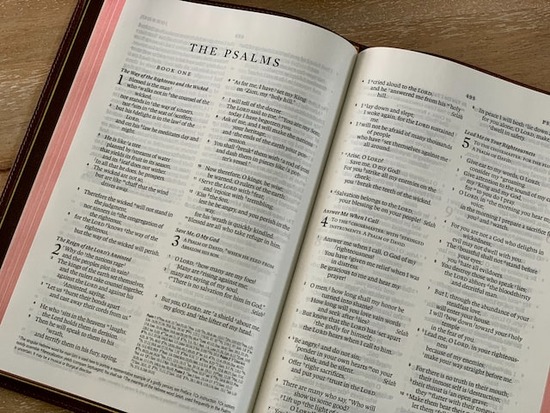 David is regarded as a hero and a great man through the ages. He was referred to as a man after God’s own heart (1 Samuel 13:14). Yes, he committed some rather startling offenses, but God worked with his trusting, humble character and his continual return to Him. This willingness to always go back to God is what gave him such a desirable description.
David is regarded as a hero and a great man through the ages. He was referred to as a man after God’s own heart (1 Samuel 13:14). Yes, he committed some rather startling offenses, but God worked with his trusting, humble character and his continual return to Him. This willingness to always go back to God is what gave him such a desirable description.
David’s physical legacy cannot be ignored either. He came from a great line of people, being the great-grandson of Ruth, who was from Moab (Ruth 4:21-22), and a descendant of Rahab, an early Gentile believer (Joshua 2:1-22; Matthew 1:5). Far back in his lineage was the Hebrew patriarch Abraham.
His descendants after him became the line of Israelite kings. Among them was his son, King Solomon, who was considered the wisest man there ever was.
All future kings were judged according to David’s standard as well. Good kings, like Hezekiah and Josiah, were said to have “[done] what was right in the sight of the Lord, according to all that [their] father David had done” (2 Chronicles 29:2, NKJV). Hezekiah and Josiah were Godly men who reformed the nation during their reigns.
David was so memorable and significant that the Syrian king Hazael wrote on a tablet, when he defeated King Joram, that he defeated the “king of the House of David.” This stone tablet is known as the Tel Dan Inscription.1
Eventually, David’s descendants became the parents of Jesus Christ, the Messiah and Savior of the world.
Besides David’s legacy as a man, he left us his gifts of prophecy and music, as manifested in the book of Psalms. The Psalms are a treasure chest of songs, praises to God, struggles, sorrows, meditations, and other poems straight from David’s heart. In them, we can see David’s relationship with God.
Some of David’s most famous Psalms include Psalm 23, 24, 90, and 103.
Many of his Psalms contain Messianic prophecies—predictions of Jesus’s first coming. One of the most well known is Psalm 22.
Takeaways from David’s life
There are many things we can learn from David’s prolific life.
- Humility. Even though he succumbed to pride later in life, his humility allowed him to be used by God in amazing ways. He wasn’t seeking his own glory, and He relied on the protection of God.
- A teachable spirit. David had his faults, but he generally stayed close to God. He is a marked contrast to Israel’s first king, Saul. David never completely rejected Scripture and God, while Saul did. He had a teachable spirit, while Saul was rebellious and stubborn.
With this attitude, David’s life is a model of a person that God can use if they are willing to let Him work through them. God does not care about our wealth, status, looks, or abilities. In fact, all those things are irrelevant when it comes to God’s plans. He sees the heart of each person, and in David He saw a heart that would learn from His instruction.
- Forgiveness. Everyone makes mistakes, even great leaders. David did some really ugly deeds, like the Bathsheba disaster. Yet God forgave him. We can remember this in our lives. We all make mistakes, but no matter what terrible things we do, God can and will forgive us and use us for good. God wants us back and is ready to forgive every time we ask for forgiveness.
- Guidance. He truly depended on God’s advice. Even when things seemed dire or hopeless, his patience in waiting for God’s timing paid off.
When David was in the cave of Adullam, hiding from Saul, he surely was afraid. But he didn’t let that fear overtake him. And in the midst of this, he penned Psalm 142, acknowledging God as his refuge.
When we try to do things on our own, well…nothing ever works out the way it was planned. Yet God knows best and will guide us if we ask for it.
- Faithfulness leads to responsibility. David started out as an average shepherd boy. Yet, when he died, he was the great king of Israel. He was so successful because he was faithful even in the small things. And because of that, God led him toward even greater responsibility. So if we are faithful and thorough in the little things in our life, God will entrust us with more and more (Luke 16:10).
The stories of the heroes of the Bible can encourage us in our daily lives. They endured trials as bad as—or worse than—we do, yet they were heroes. David had a tumultuous life, but it was ultimately successful because of his trust in God.
And God also promises to help us navigate through the tough situations we are bound to come across. If we let Him, God can do anything through any of us.
Related Articles
- “The Tel Dan Inscription: The First Historical Evidence of King David From the Bible,”, https://www.biblicalarchaeology.org/daily/biblical-artifacts/the-tel-dan-inscription-the-first-historical-evidence-of-the-king-david-bible-story/. [↵]
More Answers
Major Fulfilled Bible Prophecies You Should Know About
Prophets seem like something from novels or movies.
Judges of Israel and lessons we can learn from them
Times of crisis call for men and women of action. The Israelites, newly settled in the Promised Land, found themselves in those times. As enemy nations attacked and oppressed the tribes, they cried out to God for help. He, in turn, sent them men and women of action—known as judges.
What Is the Statue in Nebuchadnezzar’s Dream?
Ever had a dream you couldn’t remember? You know it was disturbing, but the details escape you. Ugh, the frustration!
What Are the Three Angels’ Messages in Revelation 14?
Revelation 14 in the Bible depicts three angels flying swiftly to the earth with important messages for the world right before Christ returns.
All About the 2300-Day Prophecy and the Investigative Judgment
Daniel 8:14 introduces us to the longest prophetic timeline in the Bible—the 2300-day prophecy. So what does it mean? When does it start and end, and why’s it so important?
What Is the 70-Week Prophecy in Daniel 9
Could a prophecy accurately predict an event over 500 years before it was supposed to happen?
The Creation of the World: What the Bible Really Says
When we think about the biblical Creation story, we think of just that: the world being created by the Creator. And while God’s creation of the world is marvelous and miraculous in its own right, it’s about far more than the sudden appearance of plants, animals, and humans.
Individual or Group Bible Study—Which Is Better?
They’re both great, of course! But depending on where you’re at and what your goals are, it’s worth looking into the different benefits of each.
Who Were the Israelites in the Bible?
The Israelites in the Bible, also known as the children of Israel or ancient Israel, were a nation God called to represent Him to the world. They come from the line of Abraham, whom God first made a covenant with, promising to make his descendants into a great nation (Genesis 12:1-3).
Bible Translations
Bible Translations—Which English Language Version is “Best”?The most accurate Bible possible would be one that’s printed in its original languages—Hebrew and Greek. But since most of us are not Hebrew or Greek scholars, the next best option is to find a Bible...
What’s the History of the Bible? A Complete Overview
The Bible is the number one bestseller in the world of all time.1 It’s translated into thousands of languages, read by people of all ages and backgrounds.
false vs true prophets
Have you ever wondered how people in Bible times were able to tell if their prophets were actually from God?
What Are the Beatitudes (And What Do They Mean)?
The Beatitudes, found at the beginning of Jesus’ Sermon on the Mount in the Gospel of Matthew, are Jesus’ kingdom manifesto. They describe the way His kingdom works and what it means to be one of His followers.
What Is the Fruit of the Holy Spirit in the Bible?
When we cultivate our relationship with Jesus, the Holy Spirit gives us traits that help us in our day-to-day activities and interactions. These are the fruit of the Spirit.
Healing in the Bible
Have you ever felt like healing seemed so far away? Like it wouldn’t be possible for you? What you most want is a glimmer of hope or a bit of encouragement.
Faith and Works—Do Both Matter in the Christian Life?
In so many religions all throughout time, individuals work toward enlightenment, salvation, or the favor of a deity. People are taught subtly—or not so subtly—that if you only do enough good deeds, you’ll be worthy/ascended/redeemed/approved, etc.
Does the Bible Teach Predestination?
Do your choices, actions, and habits really matter to your eternal destiny? Or is the path you choose in life predetermined, and your life is just following a script that’s been laid out for you?
The Armor of God as Described in Ephesians
In Ephesians 6, the Apostle Paul was helping people understand what it means to defend themselves within a spiritual war (Ephesians 6:10-18).
The Story of Moses in the Bible: What His Life Teaches Us
A baby on death row, an outcast prince, a humble shepherd, and an unlikely deliverer. All these titles describe the individual that led Israel out of slavery in Egypt to the borders of the Promised Land.
The 42 Kings (and 1 Queen) of Israel and Judah in the Bible
Ever wondered who all the kings of Israel and Judah in the Bible were? Meet all 42 (plus 1 queen) and learn profound, unexpected lessons from their stories
What We Can Learn from the Life of Joshua
Joshua was an iconic leader in the Old Testament of the Bible. As a successor to Moses, he was both a humble servant of God and a strong warrior. God called Him to lead the nation of Israel to take possession of Canaan, the Promised Land—a task he took on with faith and courage.
Why is Abraham Important in the Bible?
Abraham is known for being the first patriarch of the Hebrew people.
Life Lessons from Joseph in the Bible
Joseph is one of the more well-known people from the Bible’s Old Testament. He showed remarkable strength, faith, and patience—even while facing great difficulty and injustice. All because he let God lead.
Is the Old Testament Important for Christians Today?
Yes, the Old Testament is important because it kicks off the story that is continued by the New Testament. Without it, we wouldn’t have the vital background to Jesus’ first coming and the other accounts of the New Testament.
What Does the Bible Say About the End Times?
First of all, when we say “end times,” this refers to the period of time that precedes the second coming of Jesus—and the end of this sinful world before it’s recreated into the new earth. And several passages of Scripture provide us with clues and guidelines to help us recognize when these times are near, what kinds of things we can expect, and what it might mean for our daily lives and priorities.
Why Do Some Bibles Have More Books Than Others?
Christians consider the Bible as their sacred writings. But within Christianity, different denominations use Bibles with different numbers of books.
Didn’t find your answer? Ask us!
We understand your concern of having questions but not knowing who to ask—we’ve felt it ourselves. When you’re ready to learn more about Adventists, send us a question! We know a thing or two about Adventists.


